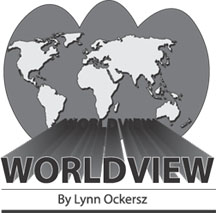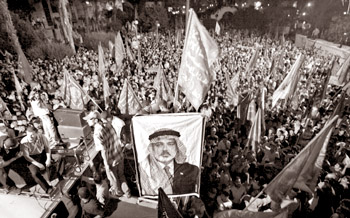Palestinian polity at a crossroad
 Whither the Palestinian people? This is the prime question posed by
the bloody, convulsive events currently breaking out in the Gaza strip
of Palestine. Whither the Palestinian people? This is the prime question posed by
the bloody, convulsive events currently breaking out in the Gaza strip
of Palestine.
Following a week of murderous violence, which claimed more than 100
lives, the Hamas faction is in control militarily in the Gaza strip,
effectively confining the political and military influence of the Fatah
faction of President Mahmoud Abbas to the West Bank.
Divided
|

Hamas supporters take part in a rally to protest against Palestinian
leader Mahmud Abbas speech in Gaza city, 20 June 2007. Abbas ruled
out talks with Hamas and accused the Islamist movement of plotting
to kill him, in his first speech since they seized the Gaza Strip.
Slamming his nemesis Hamas, with which he reached a power-sharing
agreement only three months ago, as “traitors” he defended his new
emergency government based in the West Bank and called for an
international peace conference. AFP
|
Thus have the Palestinian people come to be divided in the
middle-some owing their allegiance to Hamas, considered the more
militant and "extremist" by the West, and the others to Abbas' Fatah
faction, considered "moderate", by the West and the virtual law
enforcement arm of the Palestinian Authority.
Compounding this fundamental division is the geographical separation
of the two regions in question, conjuring the spectre of two hostile
state entities claiming to represent a single people.
Election
Currently, President Abbas enjoys the advantage of being backed by
the West, politically and financially. In fact, both the US and the EU
have resumed financial assistance to the Abbas - controlled Palestinian
Authority, following months of an aid freeze which came in the wake of
the election of a Hamas-dominated government in the Palestinian areas
more than an year ago. Thus will the West Bank be strengthened
economically and politically while the Gaza faces the prospect of
international isolation and increasing economic deprivation.
Such a situation is pregnant with negative possibilities. Increasing
material hardships in the Gaza would only encourage political extremism
among the populace and help expand the support base of the more radical
elements in the Hamas faction. The possibility that the Hamas political
leadership is not entirely in control of its armed formations, compounds
these emerging perils.
As long as the Haniyeh - dominated political leadership was in
control of the armed formations, the possibility existed of the Hamas
faction traversing a relatively moderate course in Palestinian politics.
With the armed groups taking increasing control over the faction, the
chances are that Hamas would follow a more extremist course in politics,
deepening the division between Hamas and Fatah, thus making the Gaza -
West Bank fissure geographically and politically permanent.
As to whether the Palestinian polity could be brought together again
would depend greatly on how effectively Western-backed President Abbas
heals this rift in Palestinian society and arrives at an accommodation
with the Hamas faction. In other words, a government of national unity
should be his foremost priority.
Economic embargo
On the other hand, the West, led by the US, would need to realise
that it has erred fatally by alienating the Haniyeh administration. It
is clear that an economic embargo on such a government would only
strengthen the hands of the hardliners in Hamas. Rather than weaken
political extremism, such embargoes would only have the effect of
aggravating and strengthening these tendencies.
Accordingly, a re-think on the part of the West on its Middle East
policy is urgently needed.
If the West is seeking to push forward the peace process it would
need to encourage the re-formation of a national unity government in
Palestine. Such an administration would not only need to be strengthened
in economic terms but increasingly engaged by the West politically.
[email protected]
|
